Four women Wildlife Officers wrangling problem crocodiles in Queensland
Wildlife Officer Ella Meeve has been at the forefront of multiple recent removals of ‘problem’ saltwater crocodiles, but she’s just one of four fearless females keeping Queenslanders safe.
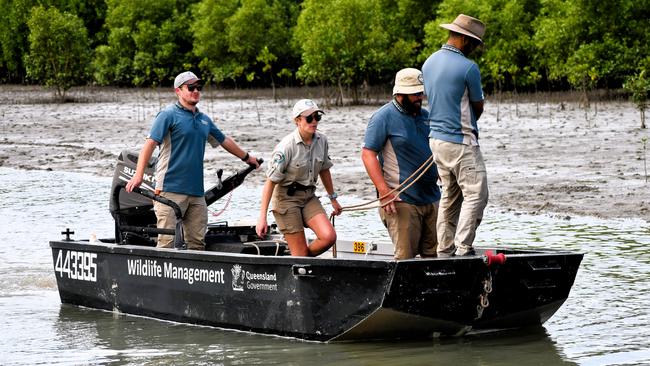
Townsville
Don't miss out on the headlines from Townsville. Followed categories will be added to My News.
Wildlife Officer Ella Meeve has been at the forefront of multiple recent removals of “problem” saltwater crocodiles, but she’s just one of four fearless females keeping Queenslanders safe.
The Townsville-based crocodile wrangler led a team of eight from the front is what was a difficult operation to capture a monster saltie from Port Hinchinbrook in Cardwell on Monday after it had made an unsuccessful attempt to make a meal out of an unsuspecting boatie.
Ms Meeve was also involved in the removals of smaller but similarly dangerous salties from a family’s backyard in Cardwell and next to Ingham State High School in February and is currently hunting a second would-be man-eater.
Ms Meeve, who has a degree in environmental management, said she had been raised on a farm and had a natural affinity toward the protection of wildlife, including as a five-year stint working in a wildlife park.
“When this job came up to be a wildlife officer, I was really drawn to it because it focuses on wildlife management; trying to balance the needs of humans and animals and that was what I was really passionate about.”
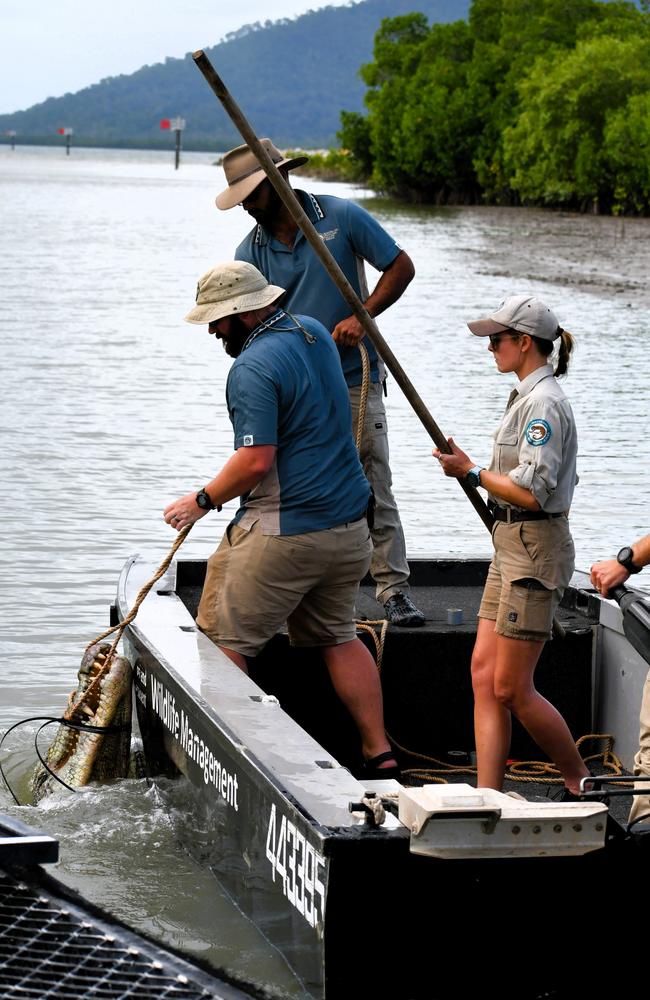
She said that despite the dangers, working for the Department of Environment, Science and Innovation (DESI) for three years had been an exciting ride.
“Every day we’re out somewhere different and I get to spend my day working outdoors in beautiful Queensland.”
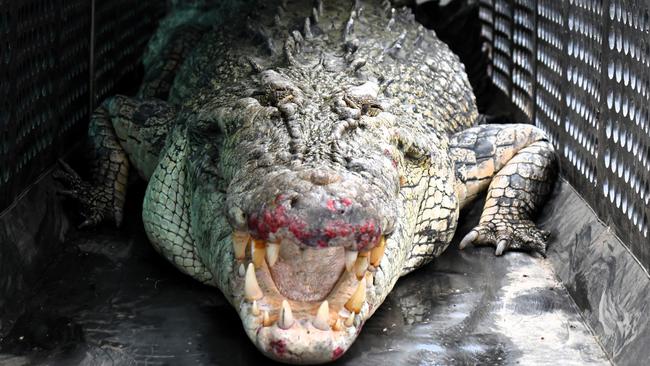
Ainslie Langdon
Wildlife Officer Ainslie Langdon gave up teaching to return to working in the field, including the important role of removing crocodiles deemed a potential threat to humans.
“After two years in the classroom, I just missed the fieldwork so much that I came back, and I’m now in my sixth year.”
She joked that it was “safer” than teaching kids.
The acting officer in charge of northern wildlife operations, who began her career as a threatened-species ecologist, said highlights of the job included involvement in research projects in the field.
“The crocodile satellite-tracking projects that I’ve been on and population surveys up in remote areas … I really enjoy those projects because they then guide our management practises.”
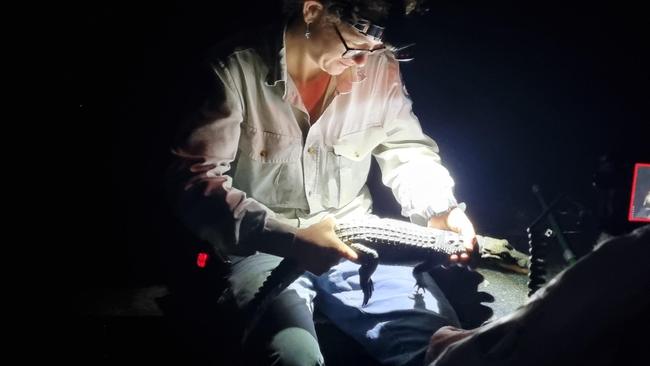
She said the other major highlight was working in remote, Indigenous communities with local rangers.
“It’s a real privilege to go out and actually be doing on-ground work with people who are really smart and really passionate and know that country really well,” she said.
“There is so much we’ve got to learn and I really love those trips.”
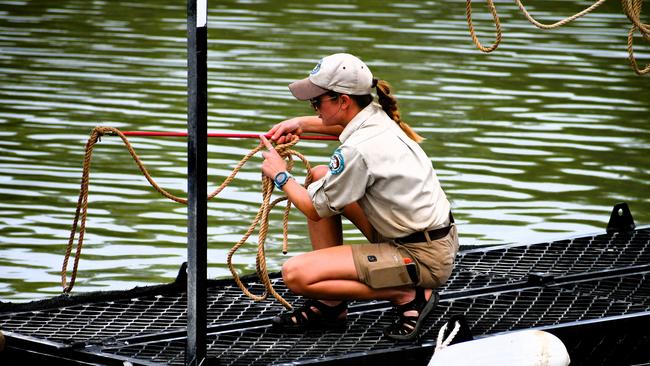
Ms Langdon said she could not speak more highly of the “job”, including for girls or young women contemplating a career in wildlife management.
“I’d recommend this role to anyone who’s got a passion for wildlife management, applied conservation, looking at policies and legislation, and being part of putting legislation into practise,” she said.
“There’s absolutely no reason why you wouldn’t: It’s a fantastic job.”
Asked if it was the best job she had ever had, Ms Langdon cracked a wide, almost crocodilian-sized smile.
“It’s pretty good, yeah, I love it … especially the team I work with.”
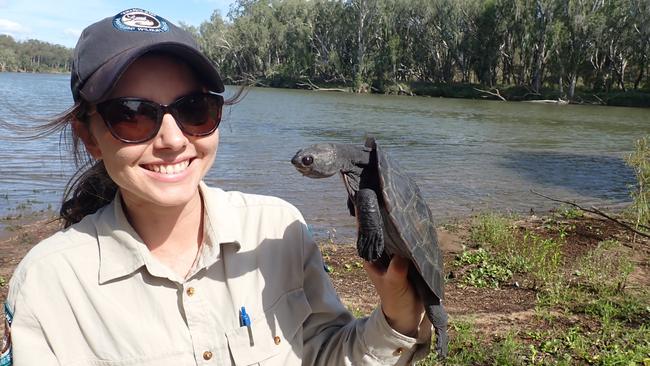
Ms Langdon said educating the public about crocodiles was also a major part of her work, given the “fear” surrounding the animals, with criticism also levelled at risk-taking locals as well as blissfully unaware tourists.
“If you follow our really simple croc-wise messaging there is no need to be afraid, you just need to be smart about how you operate in this part of the country.”
Kymberly Robinson
Kymberly Robinson said her previous role as a casual tour guide for the Parks and Wildlife evolved into a full-time role as a wildlife officer.
“I always liked the idea of working for Parks, and I liked crocodiles … and the environment in general.”
Like her fellow women in wildlife, she said there was never a dull day.
“One day we could be out in a boat responding to a crocodile sighting, we could be in a boat doing surveys, travelling somewhere to respond to a compliance matter, so it’s very diverse.”
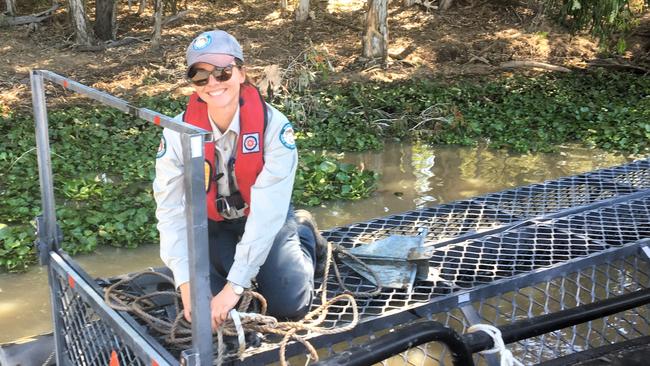
She said she had a personal penchant for freshwater turtles so a highlight was releasing a critically endangered white-throated snapping turtle back into its natural habitat after it was illegally poached from the wild.
“He’d been living in this little fish tank so once he got through all the quarantine, he had the river back to himself again, so yeah, I was pretty stoked about that.”
Ms Robinson said her role was flexible enough to allow her to complete a Master’s degree with a focus on the vulnerable Fitzroy River turtle, a Queensland native.
Jane Burns
Like her crocodile-conserving colleagues, Jane Burns forged her own path to becoming a senior wildlife officer 10 years ago.
“I was bored, I needed something more,” she said of her role as a veterinary nurse before cold calling her local wildlife office.
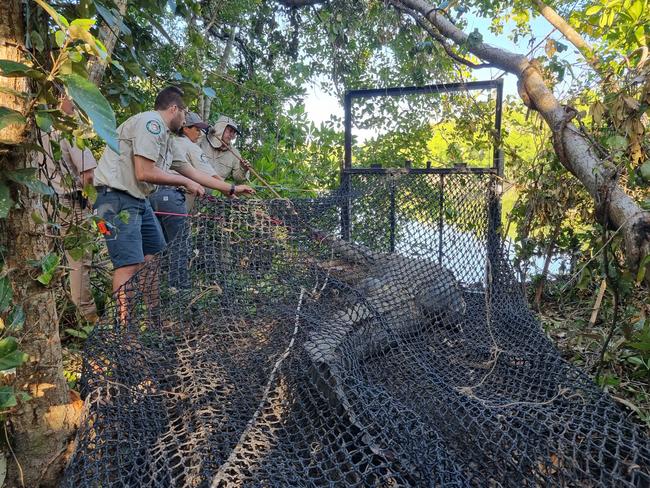
She said the targeted removal of an “iconic” 4.5-metre crocodile known as Fat Guts from the Proserpine River after the animal had begun to start approaching people and boats had been a highlight of her career.
“There aren’t that many jobs out there that we can say we do that kind of work.”
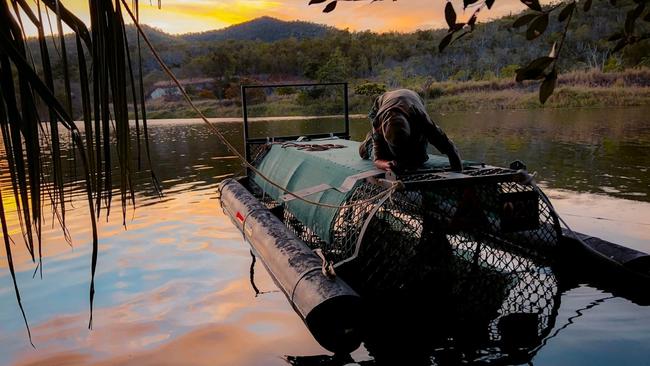
She said removing large saltwater crocodiles from the wild “commanded a huge level of respect”.
“It doesn’t matter how many times you look at them or work with them, you look at them and go ‘they are an amazing creature’, whether you love ‘em or hate ‘em, they are pretty cool,” she said.
“When you do them up close, you’ve got no words sometimes, just the size of them, the really big ones.”
Ms Burns, who is involved in sourcing new wildlife officers, had some advice for potential new recruits, including any young men considering applying.
“If we can see that you’ve got the ability, a great attitude, all of that, I’d say just jump in and apply,” she said.
“If they are keen and they love to be part of a team and want to do some cool stuff in Queensland, this is the job for them.”
More Coverage
Originally published as Four women Wildlife Officers wrangling problem crocodiles in Queensland





